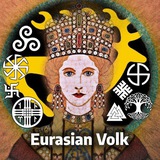Soviet soldiers of the 94th Guards Rifle Division of the 8th Guards Army prepare to enter the Frankfurter Allee subway station. April 26, 1945.
@eurasianvolk
@eurasianvolk
😢11❤3🔥1💔1
This media is not supported in your browser
VIEW IN TELEGRAM
🇭🇺🇹🇷During the Ottoman Army's siege of Belgrade in 1608, the mehter march played is being performed by the Hungarian Kecskés Ensemble group.
@eurasianvolk
@eurasianvolk
❤🔥9🔥4👍2💔1🤝1
This media is not supported in your browser
VIEW IN TELEGRAM
Κύριε, ἐλέησον (Kyrie Eleison)
@eurasianvolk
@eurasianvolk
❤11✍1👍1🗿1
